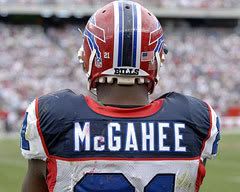Browns  Browns Archive
Browns Archive  A Bad Feeling
A Bad Feeling
 Browns Archive
Browns Archive  A Bad Feeling
A Bad Feeling
Written by
Erik Cassano
 Erik Cassano confesses to maybe just being hypersensitive to all transgressions concerning the Browns, but the recent running back shuffle with us and Baltimore has him worried. His thoughts? That maybe by signing Jamal Lewis, we did the Ravens a favor. And that Willis McGahee is the back we should have targeted from the get go.
Erik Cassano confesses to maybe just being hypersensitive to all transgressions concerning the Browns, but the recent running back shuffle with us and Baltimore has him worried. His thoughts? That maybe by signing Jamal Lewis, we did the Ravens a favor. And that Willis McGahee is the back we should have targeted from the get go.
 Maybe I'm just hypersensitive about bad things happening to the Browns, but what transpired Thursday did little to quell my concern that the Browns just got duped by the Ravens in a roundabout way.
Maybe I'm just hypersensitive about bad things happening to the Browns, but what transpired Thursday did little to quell my concern that the Browns just got duped by the Ravens in a roundabout way.
When it was announced that the Browns signed Jamal Lewis to a one-year deal on Wednesday, it was hailed by many Cleveland fans (including me) as a significant coup within the AFC North. Sure, Lewis might not be the back he was four years ago, but he still has some gas left in the tank and, hey, the Browns just made themselves stronger at the expense of a division rival, so it's like two moves in one. Right?
But did the Browns nab Lewis away from the Ravens, or had the Ravens already tossed Lewis aside for the Browns to glean?
The Ravens shrugged off the loss of Lewis in a big way Thursday, acquiring Willis McGahee from the Bills for three draft picks. Unlike Lewis, who plows through tackles and has the battle scars to prove it, McGahee makes tacklers miss with quickness and is younger than Lewis.
By acquiring McGahee, the Ravens have replaced a power back on the downhill side of his career with a faster, quicker back who hasn't yet reached his prime.
In short, the Browns might have done the Ravens a favor by eliminating any chance of a reunion with Lewis. The Browns signed a short-term upgrade for their backfield and less than 24 hours later, the Ravens ended up with a rusher who might be one of the best in the game in the coming years, especially running behind a Ravens offensive line that is markedly better than the Bills line McGahee has been tailing since 2004.
The question from this corner is, why couldn't the Browns make the McGahee trade? If you are trying to build a team from the ground up, why wouldn't you want a potentially-elite running back who can grow up alongside the rest of your offense? Why are you mish-mashing aging running backs together with inexperienced quarterbacks and a patchwork offensive line?
Meanwhile, your established division rival, the veteran team with the winning history that should be trying to plug holes with short-term solutions, is the one making the trade with long-term ramifications. It should be noted that on the heels of Thursday's trade, McGahee is expected to sign a contract extension of up to seven years.
Maybe it once again comes down to the caliber of the front office making the decisions. The Ravens have Ozzie Newsome, an elite GM making elite moves to grab elite players. As with last offseason's acquisition of Steve McNair, trading for McGahee was a crime of opportunity. It was brought about by McGahee's unhappiness in Buffalo and the Browns' possible overeagerness to pry Lewis away from Baltimore, and Newsome took full advantage of the situation.
Newsome surveyed the field and made the move that best suited his team. Browns GM Phil Savage, meanwhile, took the same tunnelvision tack that landed him Eric Steinbach last week.
There is a time and a place for locking in on a free agent and making sure he doesn't leave town without ink on a contract. The Steinbach situation was one such time. Lewis might not have been.
Newsome has his feature back for the next half-decade or longer. Savage has his feature back for the next year, provided Lewis' body stays intact that long.
It's a study in contrasts. Newsome took a wide view of his team's situation and made an impact move. Savage took a narrower view, fell in love with the idea of landing one guy, a player he helped draft, and made a short-term move.
Maybe that's why the Ravens are one of those teams that never seems to stay down for long, while the Browns seem to be constantly searching for a new GM, coach, feature back and everything else.
 Maybe I'm just hypersensitive about bad things happening to the Browns, but what transpired Thursday did little to quell my concern that the Browns just got duped by the Ravens in a roundabout way.
Maybe I'm just hypersensitive about bad things happening to the Browns, but what transpired Thursday did little to quell my concern that the Browns just got duped by the Ravens in a roundabout way.When it was announced that the Browns signed Jamal Lewis to a one-year deal on Wednesday, it was hailed by many Cleveland fans (including me) as a significant coup within the AFC North. Sure, Lewis might not be the back he was four years ago, but he still has some gas left in the tank and, hey, the Browns just made themselves stronger at the expense of a division rival, so it's like two moves in one. Right?
But did the Browns nab Lewis away from the Ravens, or had the Ravens already tossed Lewis aside for the Browns to glean?
The Ravens shrugged off the loss of Lewis in a big way Thursday, acquiring Willis McGahee from the Bills for three draft picks. Unlike Lewis, who plows through tackles and has the battle scars to prove it, McGahee makes tacklers miss with quickness and is younger than Lewis.
By acquiring McGahee, the Ravens have replaced a power back on the downhill side of his career with a faster, quicker back who hasn't yet reached his prime.
In short, the Browns might have done the Ravens a favor by eliminating any chance of a reunion with Lewis. The Browns signed a short-term upgrade for their backfield and less than 24 hours later, the Ravens ended up with a rusher who might be one of the best in the game in the coming years, especially running behind a Ravens offensive line that is markedly better than the Bills line McGahee has been tailing since 2004.
The question from this corner is, why couldn't the Browns make the McGahee trade? If you are trying to build a team from the ground up, why wouldn't you want a potentially-elite running back who can grow up alongside the rest of your offense? Why are you mish-mashing aging running backs together with inexperienced quarterbacks and a patchwork offensive line?
Meanwhile, your established division rival, the veteran team with the winning history that should be trying to plug holes with short-term solutions, is the one making the trade with long-term ramifications. It should be noted that on the heels of Thursday's trade, McGahee is expected to sign a contract extension of up to seven years.
Maybe it once again comes down to the caliber of the front office making the decisions. The Ravens have Ozzie Newsome, an elite GM making elite moves to grab elite players. As with last offseason's acquisition of Steve McNair, trading for McGahee was a crime of opportunity. It was brought about by McGahee's unhappiness in Buffalo and the Browns' possible overeagerness to pry Lewis away from Baltimore, and Newsome took full advantage of the situation.
Newsome surveyed the field and made the move that best suited his team. Browns GM Phil Savage, meanwhile, took the same tunnelvision tack that landed him Eric Steinbach last week.
There is a time and a place for locking in on a free agent and making sure he doesn't leave town without ink on a contract. The Steinbach situation was one such time. Lewis might not have been.
Newsome has his feature back for the next half-decade or longer. Savage has his feature back for the next year, provided Lewis' body stays intact that long.
It's a study in contrasts. Newsome took a wide view of his team's situation and made an impact move. Savage took a narrower view, fell in love with the idea of landing one guy, a player he helped draft, and made a short-term move.
Maybe that's why the Ravens are one of those teams that never seems to stay down for long, while the Browns seem to be constantly searching for a new GM, coach, feature back and everything else.
Posted by
Erik Cassano
Mar 08, 2007 7:00 PM
- NBA Announces 2013-2014 Schedule
- Browns Ink Sharknado
- Sharknado A No-Show For Rookie Camp
- Trent Richardson Out Until Training Camp
- Browns Sign Brandon Jackson
- Carrasco Suspended Eight Games
- Browns Add to Wide Receiver Depth with David Nelson
- Browns Need to Learn from Past Draft Mistakes
- Browns Release Chris Gocong and Usama Young
- Browns Missing on Grimes Disappointing, But Not The End
The TCF Forums
- Movies coming out
rebelwithoutaclue (Tuesday, January 21 2014 12:56 PM) - 2015 Recruiting
jclvd_23 (Tuesday, January 21 2014 12:38 PM) - The 2014 Offseason Thread
Larvell Blanks (Tuesday, January 21 2014 12:25 PM) - Official- Browns Coach Search/Rumors
Larvell Blanks (Tuesday, January 21 2014 11:53 AM) - Chris Grant's first 3 drafts
Kingpin74 (Tuesday, January 21 2014 10:13 AM) - Mike Brown
YahooFanChicago (Monday, January 20 2014 11:15 PM) - 2014 Hoops Hockey Hijinx
jpd1224 (Monday, January 20 2014 4:44 PM) - 2014 Recruiting
jclvd_23 (Monday, January 20 2014 2:26 PM) - Wish List - #4 Pick
Hikohadon (Monday, January 20 2014 1:26 PM) - #1 overall pick Anthony Bennett
TouchEmAllTime (Sunday, January 19 2014 1:28 PM)


